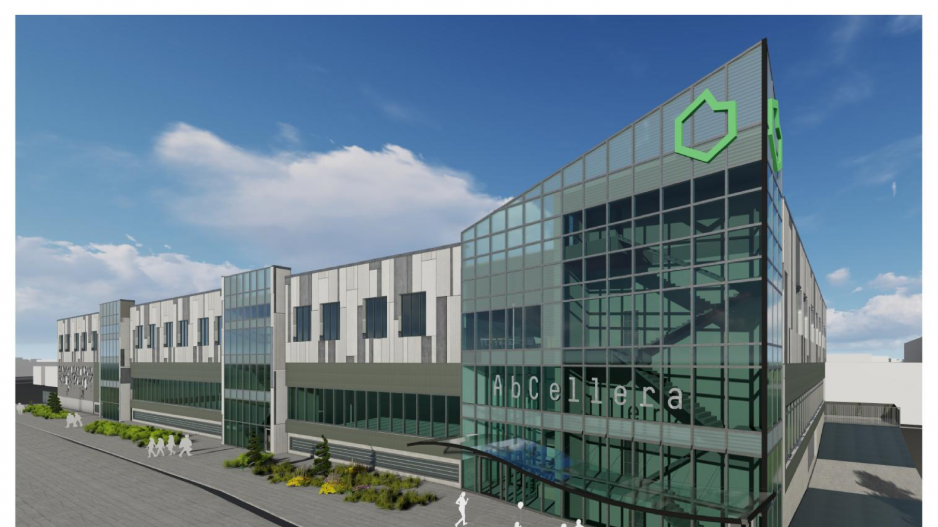AbCellera Biologics Inc. (Nasdaq:ABCL) is set to further expand its footprint in Vancouver after selecting a site in the city’s east side for a manufacturing plant.
The B.C. biotech company revealed Tuesday its new 130,000-square-foot facility specializing in the production of therapeutic antibodies will sit on the 900-block of Evans Avenue.
A new 380,000-square-foot headquarters is also under construction three kilometres west in the city’s Mount Pleasant neighbourhood.
“Up until now we've been a research-based company,” Murray McCutcheon, AbCellera’s vice-president of corporate development, told BIV.
“We are tremendously excited at this announcement, which is allowing us to move forward with the construction of the GMP [good manufacturing practices] manufacturing facility so that we can develop and manufacture the antibodies that we discovered.”
He said the plant is meant to operate in a tightly integrated way with the new HQ.
“Ultimately, we prioritized this location because we are growing the company in Vancouver, we're located here, we want to plant our flag and build an anchor company,” McCutcheon said.
“Proximity is incredibly important because we see there's an opportunity here not just to manufacture therapies — it's also to connect the research, development and … make that process faster to deliver therapies to patients more quickly.”
The biotech company, best known for specializing in antibody discovery and partnering up with American pharmaceutical giant Eli Lilly and Co. (NYSE:LLY) on a COVID-19 treatment, raised US$555 million through a blockbuster initial public offering in December 2020.
Its new facility is being funded in part by a grant from the federal government’s Strategic Innovation Fund (SIF).
In May 2020, Ottawa earmarked $175.6 million from the SIF to AbCellera to bolster the country’s response to future pandemics both through the company’s existing drug discovery technology as well as the development of a manufacturing facility.
The deal struck with the federal government will see AbCellera match the SIF funding dollar for dollar.
“It's still early in the design process at this stage, but we think that the [building] costs are likely to run in the $230 million to $250 million range when it's fully operational,” McCutcheon said.
“We know that we have grounds to make up in terms of biomanufacturing nationally, and we're incredibly excited to partner with the Government of Canada in the development of this facility and help us respond faster next time.”
The facility, due to break ground later this year before opening in 2024, combined with the new HQ would be the first of such scale in Canada capable of going from a patient sample to manufacturing antibodies for clinical testing.
In addition to offering biomanufacturing capacity, the plant will also feature lab, office and warehouse space.
Meanwhile, the new HQ will sit on West Fourth Avenue between Columbia and Manitoba. One building will measure in at 210,000 square feet once complete and the adjoining building on the new campus will come in at 170,000 square feet. Those sites are expected to be completed in 2023 and 2024.
AbCellera sent out requests for proposal a year ago across Metro Vancouver and Ontario in a bid to find a site for its new campus, which will feature labs custom-designed to bring together research that cuts across biology, software development and machine learning.
Fifty responses came back but it was ultimately the two sites located blocks away from the current headquarters on Yukon Street that ended up being the best fit.
While B.C.-based digital technology firms have been enticing global talent to work for them remotely, McCutcheon told BIV back in the spring a biotech company — one heavily dependent on lab equipment and in-person collaboration — needs to have all its workers based in Vancouver.
“Historically they've [local university grads] had to seek those opportunities south of the border,” AbCellera CEO Carl Hansen said in April.
“That's one of the reasons it is so important to have these facilities here in Vancouver. You don't want to push people out to the suburbs if you can be anywhere. People want to have that great place to work, the environment, the energy of the city, and they want to be working at the cutting edge of something they think is moving the needle for society.”
AbCellera has a headcount of 300 workers and plans on hiring about 1,000 employees over the next seven years.
The new manufacturing plant will likely be home to about 100 workers initially but McCutcheon said he expects “hundreds” to be based there in the coming years.
Precision Nanosystems Inc. (PNI), which was acquired earlier this month by Danaher Corp. (NYSE:DHR), is also embarking on expanding biomanufacturing within the region with a new $50-million facility of its own.
The federal government revealed in February it was earmarking $25 million for the endeavour as part of a bid to shore up the country’s own domestic vaccine manufacturing capacity.
PNI specializes in a class of vaccines known as self-amplifying RNA vaccines. These have the potential to create more potent vaccines as they amplify the signal, allowing PNI to manufacture more doses for less volume.
PNI’s new 40,000-square-foot facility, expected to be completed in March 2023, would be able to produce up to 240 million of the self-amplifying RNA vaccine doses.
Moderna Inc. (NYSE:MRNA) and Pfizer Inc. (NYSE:PFE) have been providing the bulk of Canada’s COVID-19 vaccine supply with their own messenger RNA (mRNA) vaccines.
PNI’s facility would be able to manufacture two million to 24 million mRNA doses – a significant difference compared with the manufacturing capacity for a self-amplifying RNA vaccine.
June 22, 2021: An earlier version of this story stated the biomanufacturing facility would be the first of its scale capable of going from a patient sample to manufacturing antibodies for clinical testing. The story has been updated to reflect the facility combined with the new headquarters would have the capacity to do so.




